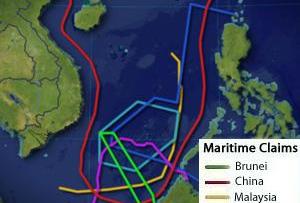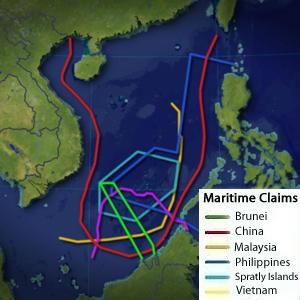Patuxent Policy Group Grapples with the China Seas


Before lunch China was ready to take on the U.S. and rule the globe, after lunch they were on their way to democracy.
Well, perhaps not exactly democracy, amended afternoon panelists who carried forth last week a day-long and wide ranging forum on how the United States can promote greater stability midst complicated rivalries, overlapping boundary disputes, historic and new strategic conflicts that define the China Seas.
Nor is China looking for war. Rather, accidents of the type that can start wars seem imminent throughout the China Seas. A particularly vulnerable relationship is the tangle of animosity between China and the United State’s ally, Japan. An egregious act against Japan could call allied action into play.
The 8th annual Patuxent Defense Forum on Rivalries and Conflicts in the China Seas was so timely this potential was playing out simultaneously as Chinese and Japanese ships faced off in contested waters in the China Sea.
This 8th forum was produced again by the successful collaboration of The Patuxent Partnership and Center for the Study of Democracy. The event brings academics, high ranking military officers and key policy analysts in government and business to St. Mary’s College in Historic St. Mary’s City.
This year’s forum was underwritten by SAIC. Sponsors were CSC and Wyle.
The collaboration has resulted in the Patuxent Policy Group. Its international reach from this small campus in Southern Maryland was noted throughout the day. A panelist praised the organization for its remarkable composition of a the panel presenting Asian Perspectives on China Sea Tensions which contained representatives of Hong Kong, Taiwan and Macau, a territory within the sovereignty of the Peoples Republic of China.
The forum opened with a panel on Balancing Economic and Military Interests in the China Seas which broke out the array of land-based interests, historic water uses and the sudden 20th century change in how the actual space of the China Sea is considered. The shift has made the sea, its surface, its bottom, its attendant air space and its boundaries, much more analogous to a nation-state’s expectations of land-based possession. And the China Sea has gained strategic significance.
“There are three levels of reality,” said the social scientist on the panel. The “real” is the sea itself, the “cognitive” is knowledge such as the disputes and complicated web of boundary claims blanketing it, and the “empirical” is the people who live within this reality.
The new strategic reality heightens the tensions already surrounding historic 20th century disputes, all of which have multiple layered meanings to the many different peoples affected. The United States’ recent spotlight on Asian relationships with its much touted “re-balancing” and “pivoting” policies has intensified the tensions. But the panelists repeated, the United States is a Pacific nation. Swinging attention toward Asia is the right approach.
Make no mistake about it, said a panelist representing the military, “China’s strategic outlook is preparing for global war with the U.S. They will never say that. But they always prepare.”
A military academic also on the panel demurred and the full panel agreed that China didn’t “want to pick a fight.” Still, panelists and audience experts concurred that the tensions in the China Sea are ripe for the types of accidents capable of igniting a war.
Opening the afternoon panels with the topic The Role of the U.S. in Promoting Free Press Reporting of the China Sea Controversies was a “60 Minutes” video of a wealthy Chinese entrepreneur claiming her county men and women openly sought democracy. After a morning of global tensions the transition was noted from the audience.
But panelist across academia and the military cautioned that the United States’ definition of democracy was not a universal version. Military experts speculated that someone not so wealthy or well known might feel less inclined to make such public statements.
It wasn’t a point lost on the panelists. The Chinese remain deeply suspicious to the point of being “obsessed . . . with conspiracy theories,” emphasized a panelist representing the military. It was one of two points repeated by multiple panelists. The other, despite China’s desire to retain and grow their recently reclaimed global stature, their largest concerns remained domestic.
Notwithstanding the tensions filling the China Seas, none on the panelists foresaw any interruption of commercial shipping activity. It is in everybody’s interest to keep everybody’s economies growing. But that appeared to be the only good news.
When asked a free-wheeling question about an imagined grand solution capable of overwhelming the historic boundary disputes and defusing the current military tensions, the panelists chuckled, looked at one another and shook their heads.























